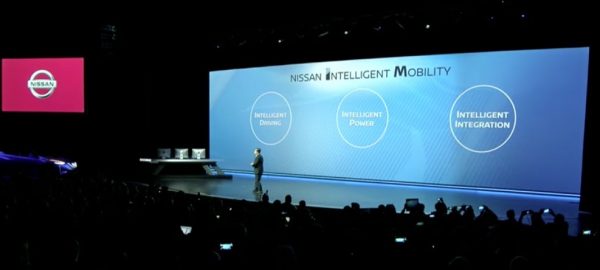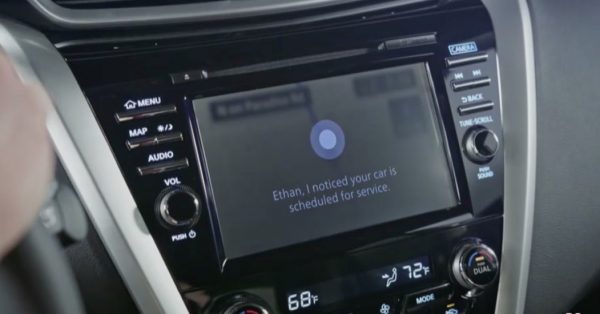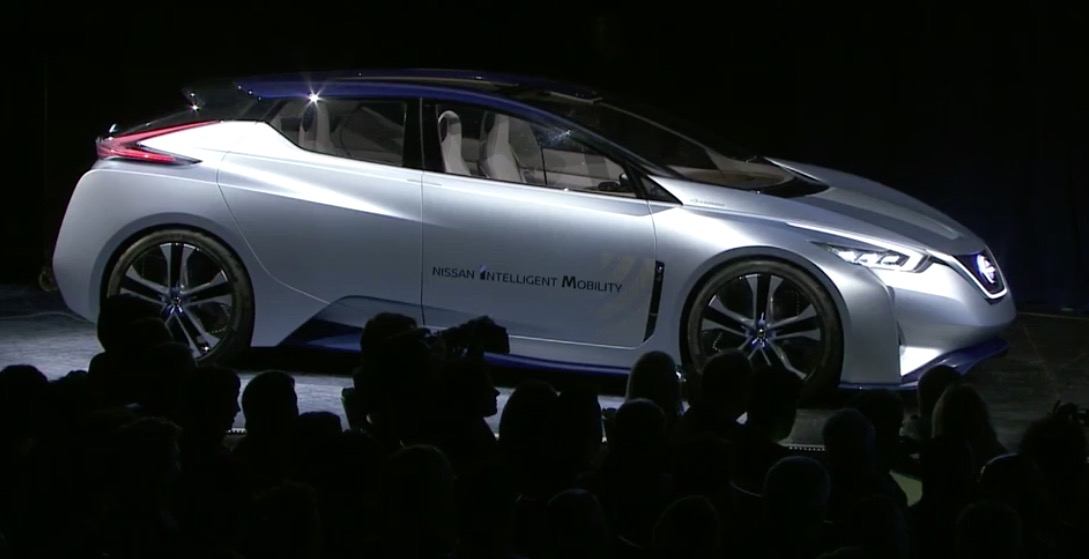For the last keynote session of the day, Nissan CEO Carlos Ghosn, along with several other Nissan executives, took the CES stage to reveal their new Nissan Intelligent Mobility initiative, demoed a new concept car with Cortana Integration, and filled us in on its plan for developing autonomous vehicles.
First up, Nissan introduced its Intelligent Mobility initiative dedicated to developing self-driving electric vehicles that aim for “zero emissions” and “zero fatalities.” Part of that initiative is a workaround solution called Seamless Autonomous Mobility (SAM) for the first generation of self-driving cars, which connects the smart vehicles to a command center, where a human manager can help autonomous cars navigate road situations their software may not be able to handle. The SAM system will then learn how the human managers solve certain situations, apply those solutions for similar future scenarios, and broadcast them to other cars within the system.
 The company went on to announce that it will equip the next generation of its best-selling electric model LEAF with the semi-autonomous ProPilot system, currently used in the Japanese-market Nissan Sirena. It also announced a partnership with Japanese ecommerce company DeNA to test driverless commercial vehicles as it hopes to launch a driverless mobility service in Tokyo by 2020.
The company went on to announce that it will equip the next generation of its best-selling electric model LEAF with the semi-autonomous ProPilot system, currently used in the Japanese-market Nissan Sirena. It also announced a partnership with Japanese ecommerce company DeNA to test driverless commercial vehicles as it hopes to launch a driverless mobility service in Tokyo by 2020.
The showiest part of the keynote was when Nissan demoed a concept car that held a decent back-and-forth conversation with its owner, thanks to an integration with Microsoft’s Cortana. Building on the partnership between Microsoft and Renault-Nissan Alliance, Nissan is aiming to bring AI-powered voice command into its vehicles for a safer, more intuitive driving experience.
 But Nissan isn’t the only carmaker that’s putting Cortana in their cars. Earlier today, BMW also announced that it will be integrating Microsoft’s voice assistant service into its new models. On a bigger picture, Ford officially became the first auto brand to bring in-car voice assistant to market as it enabled all existing vehicles running the Ford Sync 3 software to connect with Amazon’s Alexa with an over-the-air update.
But Nissan isn’t the only carmaker that’s putting Cortana in their cars. Earlier today, BMW also announced that it will be integrating Microsoft’s voice assistant service into its new models. On a bigger picture, Ford officially became the first auto brand to bring in-car voice assistant to market as it enabled all existing vehicles running the Ford Sync 3 software to connect with Amazon’s Alexa with an over-the-air update.
The competitive race of developing autonomous cars is particularly palpable at this year’s CES, with all major carmakers and some tech companies like Harman and NVIDIA showcasing some sort of driverless concept models and announcing plans to accelerate their self-driving car developments. Hyundai started hosting test drive of its driverless concept car Ioniq for press earlier today, while Honda unveiled a futuristic-looking autonomous concept vehicle named NeuV that is designed for ride-sharing services. BWM announced today that it is working with Intel and Mobileyes to start testing a fleet of 40 self-driving vehicles on the roads in the United States and Europe.
As we’ve repeatedly noted, this wave of self-driving innovation is set to bring a seismic change to the auto and transportation industries. And the arrival of self-driving cars will free up a significant amount of time spent on driving into potential media time that brands should get ready to fight over. Judging by the announcements coming out of CES, voice-activated conversational interface is set to play a major role in the future of in-car media, and it is never too early for brands start preparing for that inevitable future, especially given the quickening pace of development in self-driving cars.


